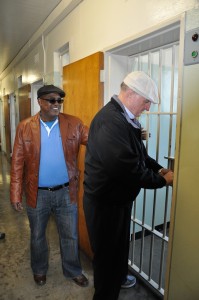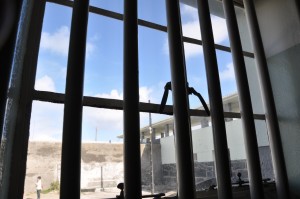Robben Island and the South African spirit of resilience
It’s almost impossible to put into words what it’s like to walk around Robben Island, an island about three miles west off the coast of Cape Town, where Nelson Mandela was imprisoned for 18 of his 27 years behind bars during South Africa’s apartheid era.
One could describe the 8-foot-by-8-foot jail cells where Mandela and many other political prisoners, including South Africa’s current President Jacob Zuma, were held captive, the solitary confinement areas, the lime quarry where inmates worked their hands to the bone, but it would simply not give this historic setting its proper due.

IU President Michael A. McRobbie unlocks the Robben Island jail cell where Nelson Mandela was imprisoned for 18 years, as former inmate Sipho Msomi looks on.
That said, there may have been no more fitting final stop to this Indiana University presidential trip to South Africa than Robben Island which, despite serving as a sad and stark reminder of so much tragedy and sacrifice, also manages to reflect a spirit of pride and resilience in the face of great challenges that gives South Africa such a special identity in Africa and around the world.
Coincidentally (or maybe not so much considering IU’s many South African connections that have surfaced this week!), Robben Island’s CEO is Sibongiseni Mkhize, who spent eight weeks studying at IU Blomington in 2001 as part of an African Studies summer program and who met with members of the IU delegation during a special alumni dinner earlier this week. (Watch “Sibo” talk about the living museum that is Robben Island in a recent Cape Town TV interview.)
When Sibo found out the IU delegation was coming to South Africa, he arranged a special tour, led by Sipho Msomi, a former Robben Island inmate. Sipho was arrested by the South African police in 1984 when he was only 20 years old, along with five other young organizers for the African National Congress. One of those organizers, he said, was tortured to death.
Sipho spent four of his five years in prison at Robben Island. Today, he leads tours of the island, recounting his and other prisoners’ tales of sacrifice, while giving his guests a strong sense of how the island has been transformed into a beacon of African pride and spirit.
Sipho took us to the jail cell where Mandela was imprisoned and slept on the cold stone floor, often with just a thin blanket to protect him from the island’s often frigid temperatures. He also showed us to the courtyard where inmates gathered, talked about the cement bags and toilet paper that Mandela and others could sometimes use as writing surfaces and brought us to the solitary confinement area where he, himself, spent 10 months.
Sipho then sent us off on a short bus ride to another area of the island, where Robert Sobukwe, who became president of the Pan-Africanist Congress in opposition to apartheid in 1959, spent six years in solitary confinement, his imprisonment renewed annually by the Minister of Justice in a procedure that became known as the “Sobukwe clause.” The clause was never used for anyone else, and Sobukwe, who lost the use of his vocal chords while at Robben, was ultimately held under house arrest by the national government until his death in 1978. Before his death, though, he earned a degree in economics from the University of London.
Finally, it was on to the lime quarry where Mandela and others were sent to work until their hands blistered and bled. The barren quarry, which wouldn’t be out of place back home in Bloomington, Ind., could’ve simply been a place of great hardship. Instead though, it was transformed, through education, into a place of hope. Here, at what became known as “Robben Island University,” many of South Africa’s most prominent prisoners at the time, including Mandela, engaged in discussions and debate over a wide range of topics, including democracy, socialism, political protest movements and more.
When President Barack Obama visited Robben Island back in June, he and First Lady Michelle Obama signed a guest book, writing, “On behalf of our family we’re deeply humbled to stand where men of such courage faced down injustice and refused to yield. The world is grateful for the heroes of Robben Island, who remind us that no shackles or cells can match the strength of the human spirit.”
As members of the IU delegation prepare to leave tomorrow for their next stop (Kenya), they won’t soon forget the spirit of South Africa, as they look forward to new partnerships here that stretch the minds of IU students who will study abroad here, help this wonderfully dynamic nation seize the many opportunities before it and keep alive the flame of “Robben Island University.”
Tags: apartheid, Indiana University, IU, Jacob Zuma, Michael McRobbie, Nelson Mandela, Obama, Robben Island, Robert Sobukwe, Sibongiseni Mkhize, Sipho Msomi, South Africa


